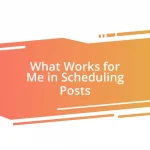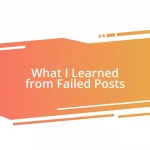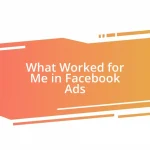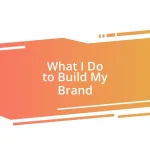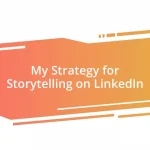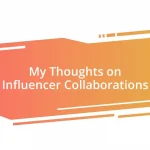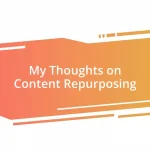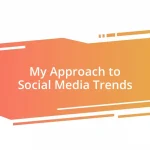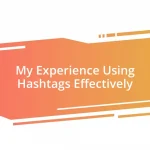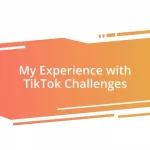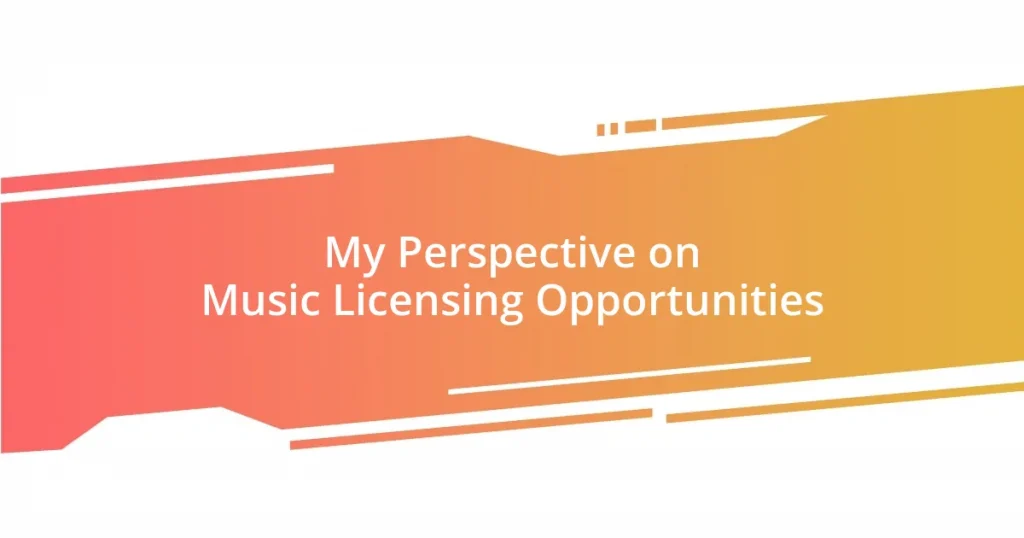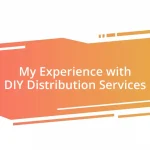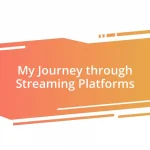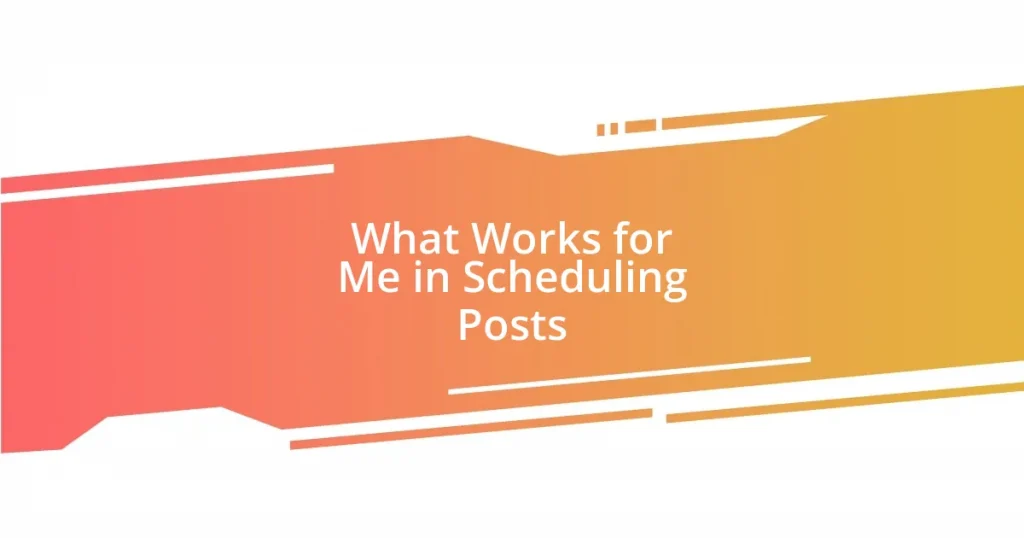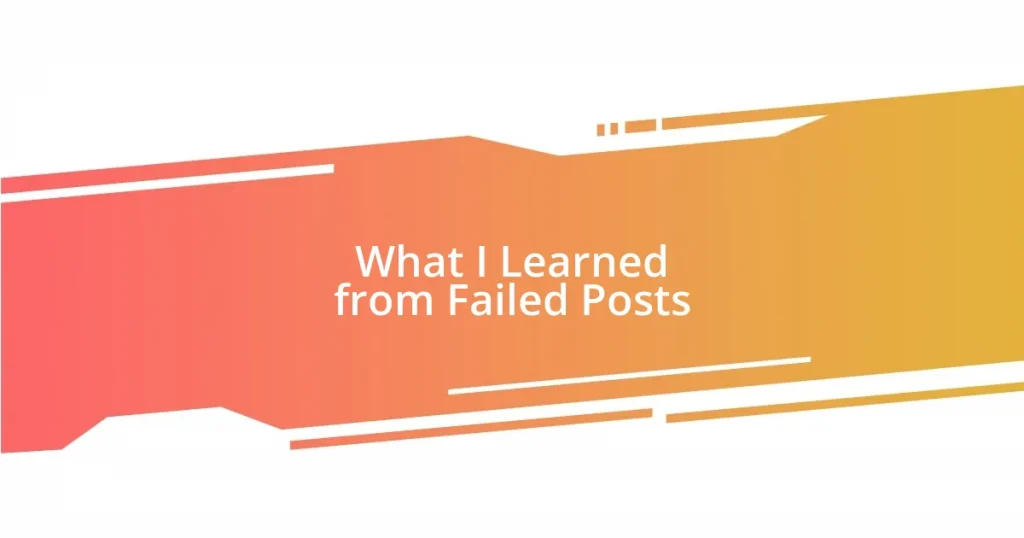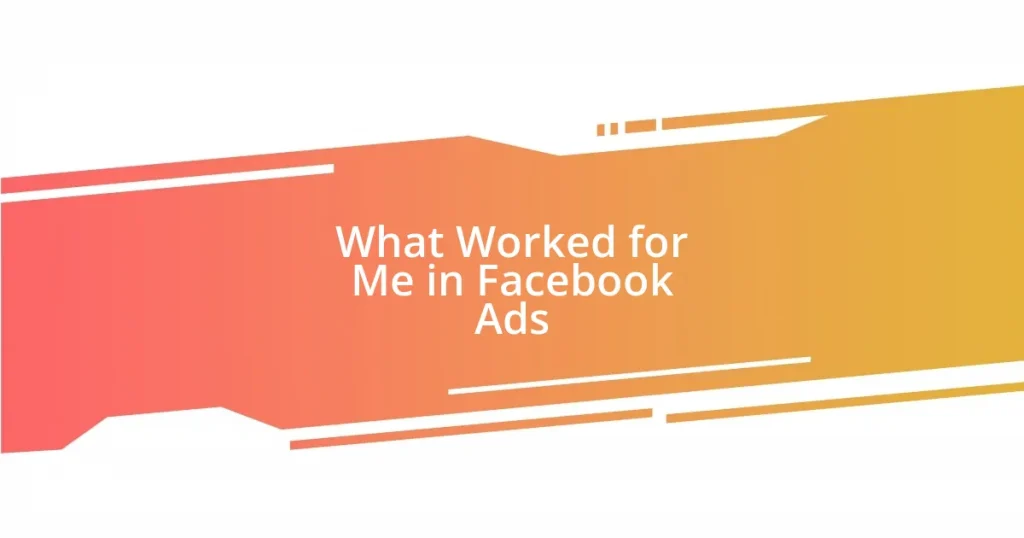Key takeaways:
- Understanding different types of music licenses (sync, performance, mechanical) is crucial for monetizing artistic work.
- Key players in music licensing include music publishers, performing rights organizations, record labels, and media companies.
- Current trends highlight the increasing demand for licensed music in digital platforms, and targeting niche markets can enhance licensing opportunities.
- Building relationships and maintaining flexibility in negotiations can lead to successful licensing deals and creative collaborations.
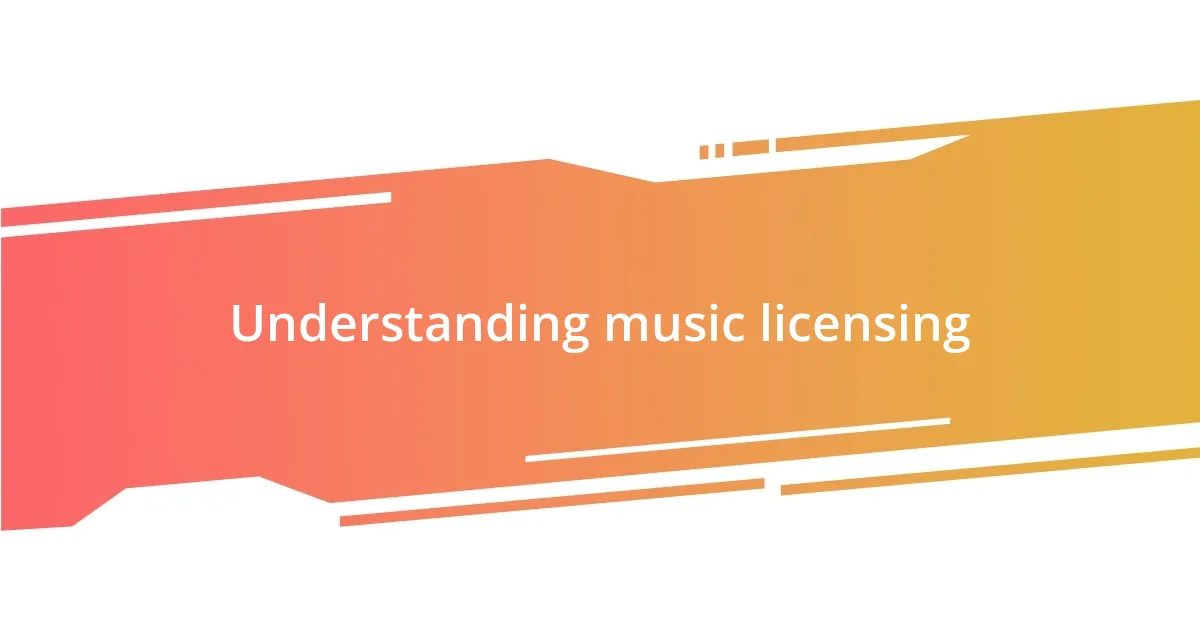
Understanding music licensing
Music licensing can feel a bit like navigating a maze. For artists and creators, understanding the various types of licenses—like sync licensing for film or mechanical licenses for distribution—can open numerous doors to monetizing their work. I remember the first time I got asked to license a track for a short film. It felt exhilarating, but also a bit daunting. What rights was I giving up? What was the fair rate? These questions ran through my mind.
When I think about music licensing, I can’t help but consider its role in ensuring that artists are compensated for their creativity. Music plays an integral part in our lives, and the thought of it being used without permission can be frustrating. Have you ever encountered a song that just brings back a flood of memories? That emotional connection is a reminder of why licensing is crucial. It ensures creators receive credit and payment, creating a sustainable environment for their craft.
Navigating the world of music licensing isn’t just about contracts; it’s about respect for the art. I often reflect on how licensing can turn a simple melody into a source of income that fuels creativity. Isn’t it fascinating how a song you wrote could become the backdrop to someone’s cherished moment? That’s the beauty of music licensing—it connects artists with opportunities while honoring the hard work they put into their art.
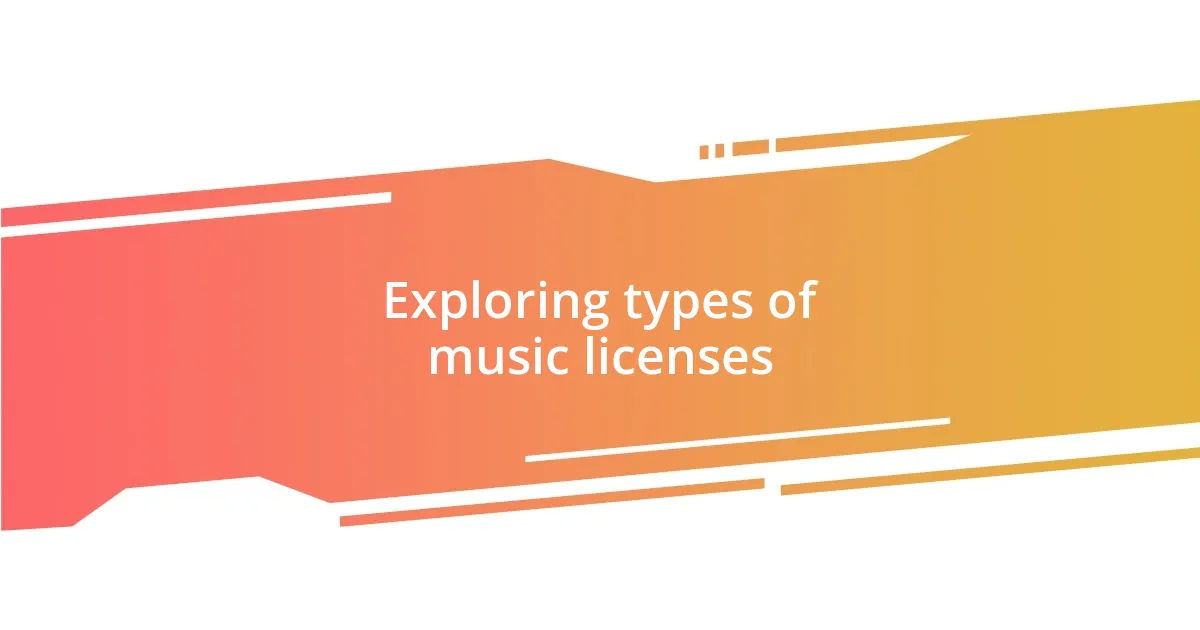
Exploring types of music licenses
A shift in perspective can broaden your understanding of performance licenses. These licenses are vital when a song is played in public venues, ensuring the artists get recognized for their work. I once played a local venue where the energy was electric, and the thought that my music might be enjoyed live gave me an incredible thrill. Performance licenses enable that connection between artists and audiences, ensuring we’re acknowledged for our creative efforts.
Lastly, don’t overlook the importance of mechanical licenses. They cover the production of physical copies of music—like vinyl, CDs, or digital downloads. I still remember the pride I felt when I held a physical copy of my album, realizing all the hard work was finally paying off. Understanding these licenses not only protects your work but also empowers you to explore various revenue streams in the music industry.
| Type of License | Description |
|---|---|
| Sync License | Allows the pairing of music with visual media. |
| Performance License | Covers public performances of music, ensuring artists are compensated. |
| Mechanical License | Enables the production of physical music copies. |
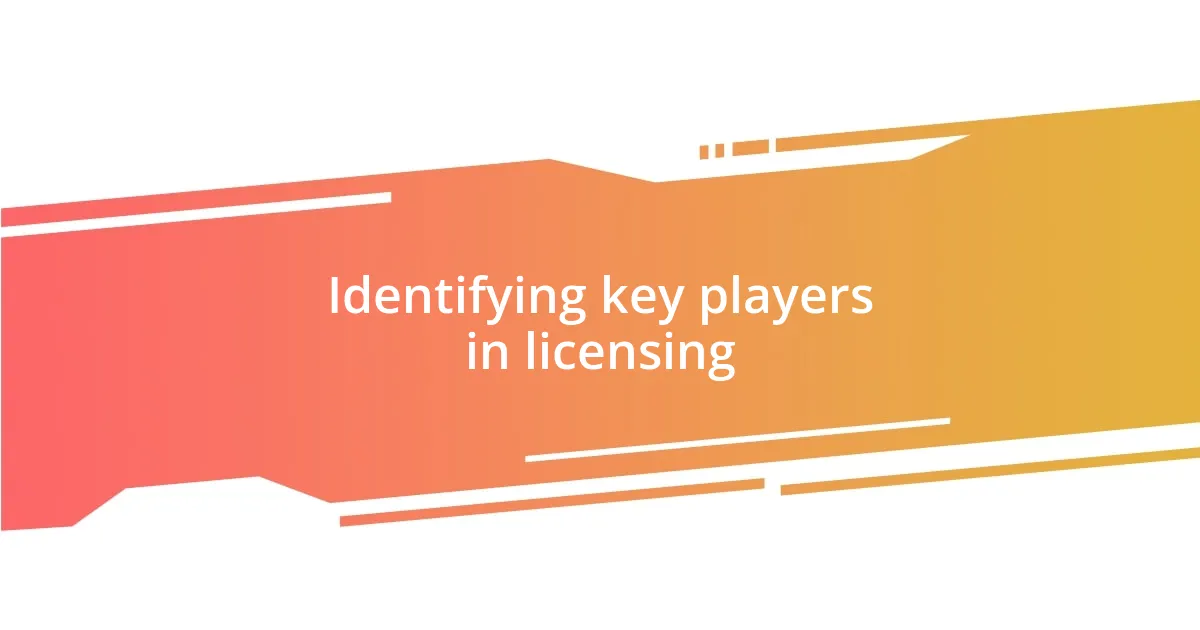
Identifying key players in licensing
Identifying the key players in music licensing is essential for anyone looking to navigate this often complex landscape. In my journey, I discovered that understanding who’s involved can make a significant difference. It’s not just about knowing your rights but also about recognizing the people and organizations that help facilitate these licensing agreements. Whether it’s music publishers, performing rights organizations, or producers, each group plays a pivotal role in ensuring that artists are compensated fairly.
Here are some of the primary players to be aware of:
- Music Publishers: They manage the rights and royalties for songwriters, actively seeking licensing opportunities for their works.
- Performing Rights Organizations (PROs): These organizations, like ASCAP or BMI, collect performance royalties on behalf of artists when their music is played publicly.
- Record Labels: They often own the rights to sound recordings and can negotiate licensing deals for their catalog.
- Media Companies: These are the end-users of licensed music, such as filmmakers and ad agencies, which require soundtracks for their projects.
Understanding these roles can help you forge connections that could lead to exciting licensing opportunities. I remember attending a local film festival and meeting some aspiring directors. Just the thought of my music enhancing their storytelling made my heart race. That moment underscored the importance of knowing who the players are. It’s all about building relationships and creating opportunities for collaboration. The world of music licensing can indeed be a labyrinth, but having a clear map of its key figures can make your journey so much more rewarding.
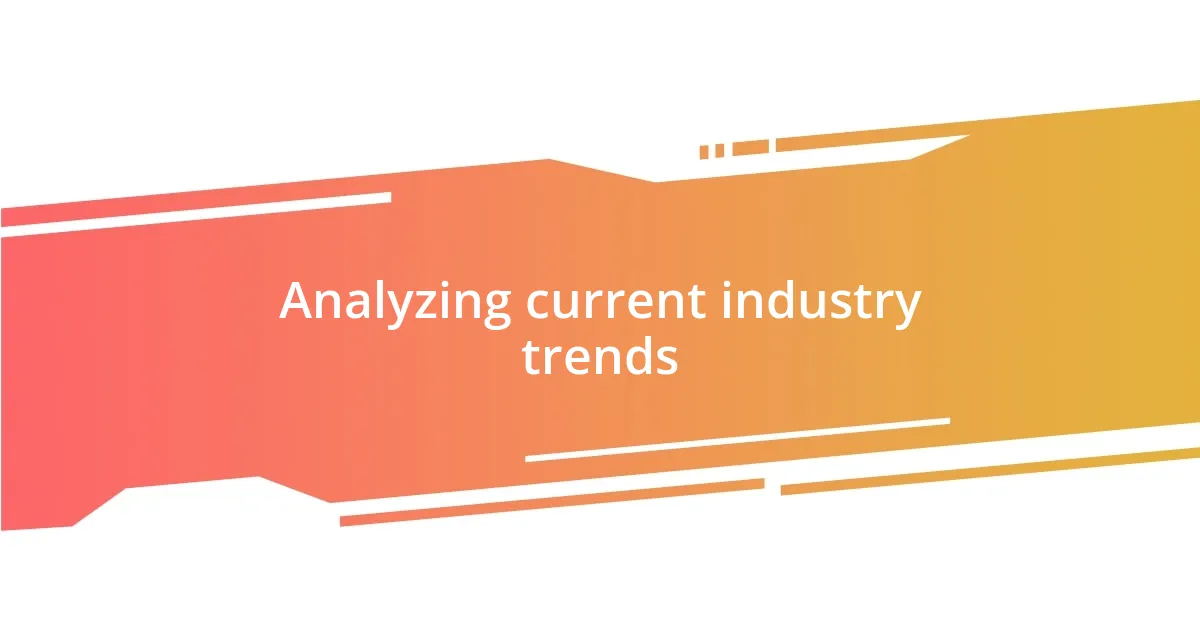
Analyzing current industry trends
The music industry is currently seeing a remarkable increase in the demand for licensing, driven by the rise of digital platforms and streaming services. I’ve noticed that more creators are seeking opportunities to get their music featured in podcasts, video games, and online content. This shift is not just a passing trend; it’s reshaping how artists think about their work and the potential revenue streams available to them.
One trend that stands out involves the growing interest in niche markets. Artists are now tailoring their music for specific genres or themes, optimizing their chances of being licensed. I remember a friend of mine created an ambient track specifically for guided meditations. It wasn’t long before she started receiving requests to license it for various wellness apps. This experience opened my eyes to how targeting a specific audience can lead to unexpected and rewarding opportunities.
Moreover, the impact of social media cannot be overlooked. Platforms like TikTok have transformed music licensing by giving artists a unique path to audience engagement. I still recall when a snippet of one of my tracks went viral in a dance challenge. That exposure led to multiple licensing offers I’d never anticipated! It’s a reminder that in today’s landscape, success often blends creativity with strategic digital engagement. Are you exploring how your own music can fit into these evolving trends?
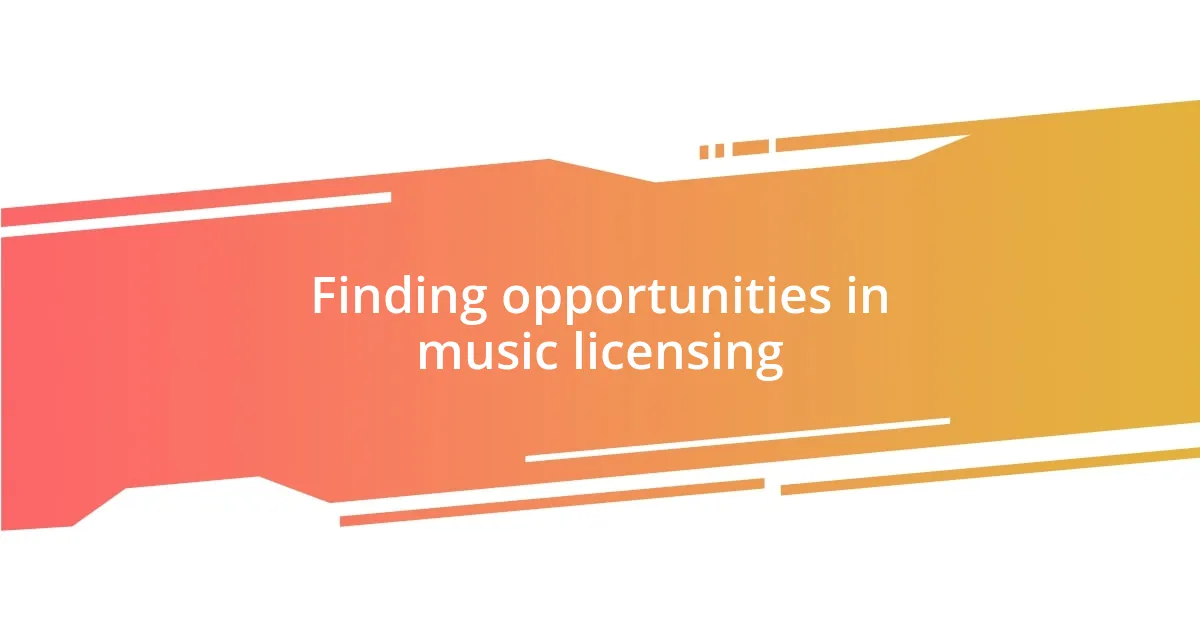
Finding opportunities in music licensing
Finding opportunities in music licensing involves being proactive and open to various avenues for your music. I once attended a local networking event specifically for content creators and discovered how many filmmakers were searching for original tracks to enhance their narratives. This unexpected encounter opened my eyes to the endless possibilities outside of traditional music venues, highlighting that sometimes the best opportunities can come from the most unlikely places.
As I explored this path, I began to see that many businesses require custom music for their branding efforts. A memorable moment for me was when a small startup approached me to create a jingle that captured their essence. It didn’t just help me gain exposure; it allowed me to collaborate with creatives from different disciplines, which enriched my experience as an artist. Have you considered reaching out to local businesses to see if they might need a fresh sound for their marketing?
I’ve found that approaching music licensing as a mindset rather than a mere transaction can lead to greater opportunities. For example, joining online communities of filmmakers and content creators created a space for me to share my music while learning about their specific needs. It’s amazing how such simple interactions can lead to significant projects. Have you thought about how community engagement can shape your music licensing journey?
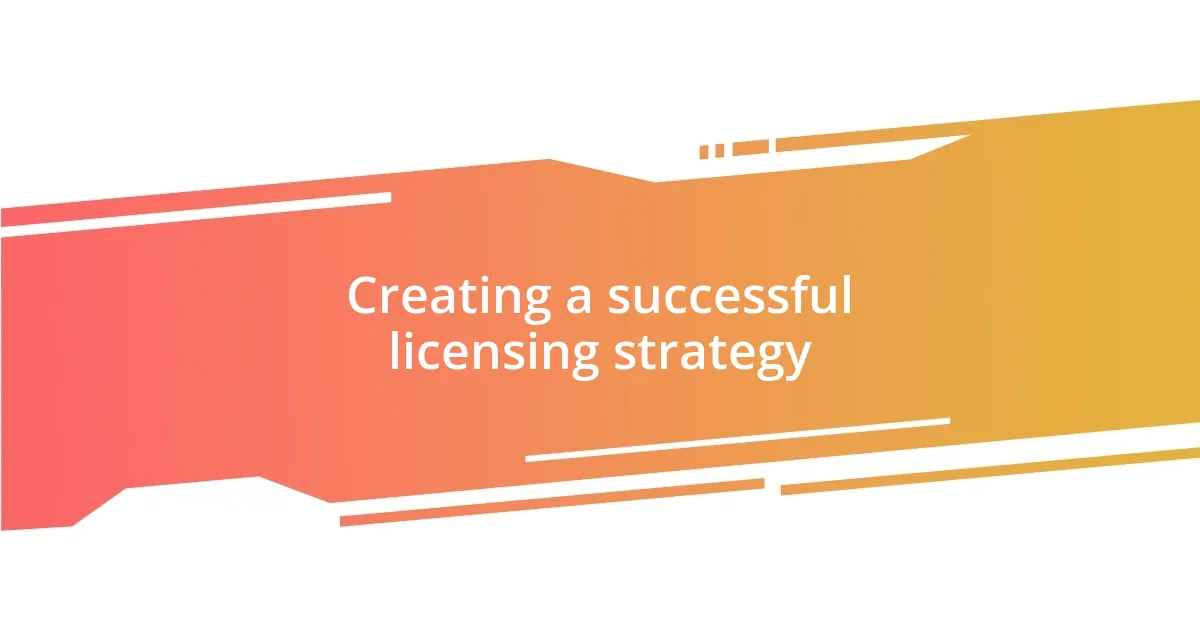
Creating a successful licensing strategy
Creating a successful licensing strategy hinges on understanding the unique needs of your potential clients. I vividly remember when I partnered with a documentary filmmaker who was seeking a specific soundscape to match the emotion of his project. By taking the time to understand his vision and how he intended to use my music, I was able to craft the perfect track that not only enhanced his narrative but also secured a rewarding licensing deal. Have you ever considered what specific elements your music can bring to different projects?
Additionally, I’ve learned that keeping a flexible approach can yield tremendous benefits in the licensing world. One of my proudest moments was when I reshaped a more aggressive rock track into a softer, acoustic rendition, initially intended for a different audience. This adaptation not only caught the attention of a well-known ad agency but also opened the door to licensing opportunities I had never anticipated. Isn’t it fascinating how a little creativity can transform your music into a versatile asset?
Finally, building relationships is crucial. Early in my licensing journey, I struck up a conversation with a local podcaster at an event. That rap session turned into a fruitful collaboration where I provided original scores for her episodes. Maintaining that open line of communication not only led to repeat licensing but also earned me a loyal advocate who referred me to others. Have you thought about how nurturing these connections can be a game-changer for your licensing strategy?
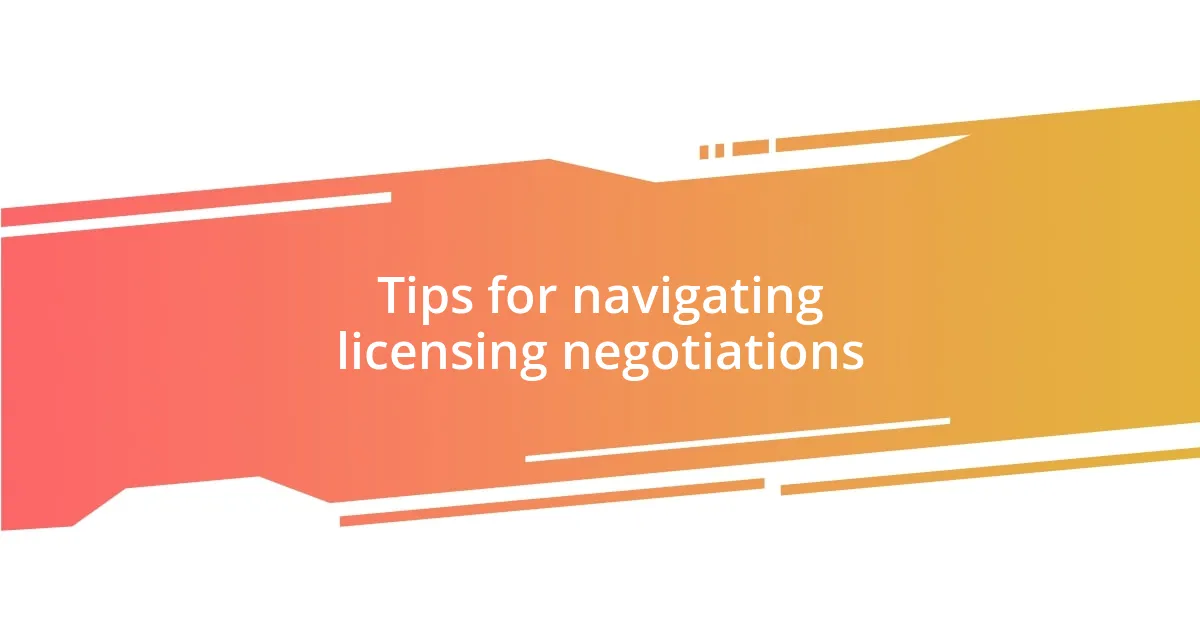
Tips for navigating licensing negotiations
Negotiating music licensing can be quite an intricate process, so I’ve found it essential to do my homework before entering these discussions. I recall a time when I misjudged the value of my work during negotiations simply because I lacked insight into industry standards. Understanding the typical licensing fees and terms for similar tracks gave me the confidence to advocate for my worth, ultimately leading to a deal that was both fair and rewarding. Have you ever felt unsure about how to price your art?
It’s equally important to approach negotiations collaboratively rather than combatively. In one instance, I was approached by a game developer who had a clear vision, but the budget constraints were tight. Instead of being rigid, I engaged them in a conversation about their project and explored alternative ways we could work together, leading to a compromise that fulfilled both our needs. This taught me that flexibility can often pave the way for creative solutions. Have you considered how a spirit of cooperation can turn negotiations into win-win situations?
Lastly, don’t shy away from expressing your creative vision during negotiations. I remember discussing a licensing deal with a filmmaker who was looking for something very specific. By sharing my ideas on how my music could enhance the storytelling, I sparked enthusiasm and reinforced my value beyond just the track they initially heard. This interaction not only strengthened our relationship but also resulted in a project that truly resonated with both of us. Isn’t it incredible how sharing your passion can elevate the entire licensing experience?
